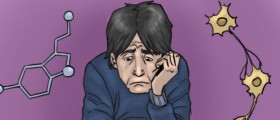
Mental illness is group of diseases or conditions that affect the brain and influence the way a patient thinks, feels, behaves and relates to other people or surroundings. Patients suffering from mental illness are often unable to cope with everyday life demands even though the symptoms may vary from person to person ranging from mild to extremely severe.
Statistics
Around 23% of American adults, about 44 million people, and about 20% of American children suffer from a mental disorder. Around 5 million of Americans adults, and more than 5 million children and adolescents suffer from a serious mental condition that severely affects functioning.
The most common mental diseases in the United States are depression, bipolar disorder and schizophrenia.
Causes
Causes of mental illness are not completely understood, however, it is clear that many of these conditions are caused an amalgamation of inherent, biological, mental and environmental factors. One certain thing about mental illnesses is that they are not the result of individual or character weakness and recovery from a mental illness is not merely a subject of self-indulgence.
Genetics
Mental illnesses may often run in the family. Hereditary illnesses are being passed on from parents to offspring through genes. However, genes bear a mare possibility for a disease to develop. It does not mean that children must necessarily develop mental illness if one (or both) of their parents has it. Mental illness is most probably linked to a number of genes, not just one, so that the person inherits a vulnerability to mental disorder, but does not always develop it. Disorder itself may occur as a result of interaction between the genes and other factors such as psychological or environmental stress.
Biology
Certain mental disorders may occur as a result of chemical imbalance in the brain. Chemicals called neurotransmitters mediate communication between the brain cells. If these chemicals get out of balance, it affects the flow of the information between the brain cells, leading to symptoms of mental disorders. The same effect may occur due to the defects or injury to some areas of the brain.
Mental trauma
Mental illnesses may often be triggered by psychological stress or trauma suffered in early age. Some of the most common examples include emotional, physical or sexual abuse; the loss of parent or close relative and parental neglect.
Environmental stress
The most common environmental stresses are death or divorce, dysfunctional family life, changing jobs or school and substance abuse. All of them may trigger a disorder in person that is already at risk of developing a mental illness.
Treatment
Mental illness is a chronic disease that requires an ongoing treatment. It usually involves combination of therapies such as medication, psychotherapy, group therapy, day treatment or partial hospital treatment, cognitive-behavior therapy, alternative therapies, creative therapies, hypnotherapy, electroconvulsive therapy, or vagal nerve stimulation.
















Your thoughts on this
Loading...